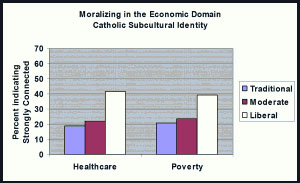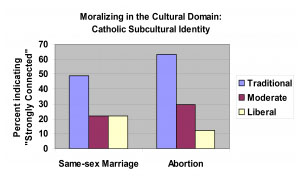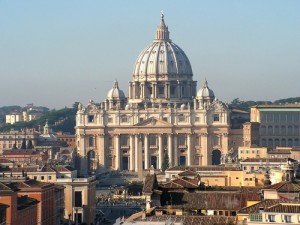Carol Ann identified several important questions that I want to explore in future posts.
For this post, I want to explore her insight regarding the underlying question for many of “why this issue now?” (a battle over contraception at a time of economic hardship for millions?) As she recognizes, it is not an either/or choice and certain Church leaders self-consciously speak out on both sets of issues. Furthermore, the selection of this particular issue at this particular time was driven by the creation of new rules by HHS administration.
But, still, this sentiment, which she identifies, helps us to think about and ask “Which issues (e.g., abortion vs. poverty) are discussed, debated, and focused on in the public arena and by whom?”
I have done research on this topic and my results suggest that Catholic identity politics are intimately connected to these distinctions. In my graphs for this post, I simply show which domain (and issue) is emphasized as “strongly connected to ultimate principles of right and wrong” according to self-identified religious identity.


It is clear that traditional Catholics are most likely to see cultural issues of abortion and same-sex marriage as moral issues, whereas liberal Catholics are most likely to see economic issues of health care and poverty as moral issues. This bifurcation in the moral worldview of Catholics helps us to understand current dynamics, but it also allows us to see the way in which the Catholic Church in the U.S. is fragmented. This is both understandable and potentially troubling.
Transcending (though not necessarily eliminating) such identity divisions will likely be an important task for the Church in the U.S. moving forward.







